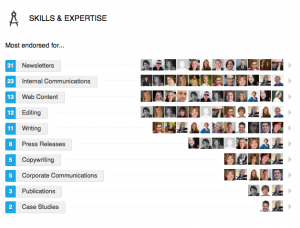 Writing speeches is a skill I do not possess. In no universe do I claim such expertise. In fact, my expertise is knowing to call on an expert. My LinkedIn profile suggests that if you need someone to work on newsletters, I’m your gal. Speeches? I know some people and would be happy to refer you to them.
Writing speeches is a skill I do not possess. In no universe do I claim such expertise. In fact, my expertise is knowing to call on an expert. My LinkedIn profile suggests that if you need someone to work on newsletters, I’m your gal. Speeches? I know some people and would be happy to refer you to them.
So why did I end up with a LinkedIn endorsement for speechwriting?
No doubt my contact had the best of intentions of being helpful and supportive. I appreciate the thought. Yet there is no value in giving an endorsement just because LinkedIn helpfully asks, “Does Sue know about X?”
LinkedIn says in its Help Center that “endorsements are a great way to recognize your 1st-degree connections’ skills and expertise with one click.” That’s true. But it has made endorsing people as easy as clicking “like” on Facebook, and about as meaningful.
In a post about how to make the most of LinkedIn endorsements, Forbes.com had some recommendations, to which I’ve added my own opinions:
- Don’t automatically accept every endorsement, just the ones that reflect what you want to do more of. Hide the ones you don’t want or that aren’t accurate by going to profile > edit > Skills & Experience > pencil icon > Manage Endorsements.
- Look for patterns. If people aren’t endorsing you for the types of things you want to do, try promoting these skills. My experience with “speechwriting” suggests that LinkedIn searches the forums in which you participate and the things you say there as well as the words in your profile.
- Don’t endorse someone for expertise you can’t vouch for, even if you’re just trying to be nice.
- Don’t give an endorsement just because you got one, unless you have some knowledge about the person’s skills. If someone is truly outstanding, take the time to write a more meaningful recommendation. If they aren’t, don’t endorse. If you’re not sure, see #3.
- Use an endorsement as an opportunity to rekindle a relationship. Take the time to send a note or suggest getting together to catch up.
Many of my LinkedIn connections aren’t close enough friends or co-workers that I have direct knowledge of how well they think strategically, manage projects or write speeches. For that reason, I generally ignore LinkedIn’s random prompts to endorse. So if you have endorsed me and I didn’t automatically endorse you back, that’s why. Sorry. I can be that way about ‘liking’ people or companies on Facebook, too.
How do you use endorsements? Do you just agree to random suggestions or do you deliberately go to certain profiles and make more “strategic” endorsements?

Couldn’t agree with you more, Sue.
Most of the time, when I get a random endorsement from a person who is not a client, I send them a message to say “thank-you” but advise them that it’s not proper etiquette to endorse people’s skills unless you can stand behind that endorsement.
I really don’t like where Linkedin is going with this. All I can see in “recent updates” is “such-and-such endorsed the skills and expertise of:” People are endorsing left and right, most likely in the hope that they will receive an endorsement in return, but if we all endorse each other, what’s the point?
I still make a point in asking my clients for a recommendation because it takes more effort to write one.
Another way to get recommendations is via one’s company page, for specific services or products. Although those can also be given very quickly by simply pushing a button, I make a point of asking for a comment, and usually get it.
Thanks for commenting, Boris! It all seems like a big popularity contest, doesn’t it?
I think LinkedIn needs to change the endorsement process. It’s too easy. And once I start clicking, it can be hard to stop. I should not have to do anything extra to hide endorsements that aren’t appropriate. I’m too busy for your shenanigans, LinkedIn.
Ha! Thanks for the laugh, Barb. I, too, am too busy for LinkedIn’s shenanigans.
Thanks for sharing this post Sue! Definitely some sound advice.
Interesting that it’s when my LinkedIn contacts started endorsing me for speech writing that I knew the feature had definitely gone off the rails. While I think I have what it takes to write a good speech it’s not one of my core competencies and not a skill I’d consider trumpeting on LinkedIn.
Presumably you’re right and if you can write, you should be skilled at all sorts of writing according to LinkedIn!
Funny that “speechwriting” was the endorsement that pushed us both to write about endorsements! For others who haven’t read his post, see it here: http://www.communicateandhowe.com/2013/08/19/whats-the-worth-of-linkedin-endorsements/.
Thanks for commenting, James. I would have commented on your blog too but that extra step of having to sign in stopped me.